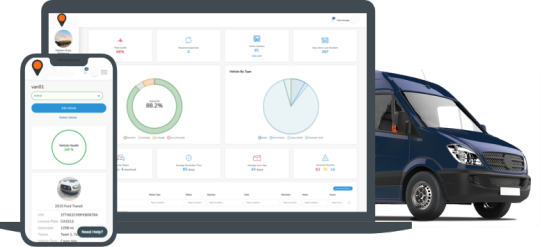#in vehicle monitoring system
Text

TrakkerME
#vehicle tracking system dubai#in vehicle monitoring system#vehicle tracking system uae#vehicle tracking system in dubai#vehicle tracking system suppliers in dubai#vehicle tracking system companies in dubai
0 notes
Text
Battery Management System: Keeping Lithium-Ion Batteries Running Smoothly

A battery management system, also known as a BMS, is an important component used in lithium-ion battery packs. The primary purpose of a BMS is to protect the battery by regulating voltage, current, and temperature. It does this by continuously monitoring individual cells and the overall battery pack performance. Properly functioning BMS are essential for safety and extending the usable life of lithium-ion batteries used in various applications from electric vehicles to consumer electronics.
Monitoring Battery Performance
One of the key roles of a BMS is to continuously monitor the voltage, current and temperature of each individual battery cell. Lithium-ion batteries cannot be overcharged or over-discharged as it can cause damage or hazards. The BMS monitors cell voltages and balances charging currents to keep all cells within a safe operating window. It prevents any single cell from charging too much compared to others which could cause issues. Temperature is also closely tracked to avoid operation in temperature extremes that can degrade battery performance over time.
Cell Balancing for Extended Life
Over time small differences in battery cells can occur due to manufacturing variations or uneven aging characteristics. A good BMS performs active cell balancing to keep all cells at an equal state of charge. This prevents any cells from becoming more drained than others which could lead to early failure or unsafe operation.
Cell balancing helps maximize the usable capacity of lithium-ion battery packs and extends their lifecycle. Constant monitoring and active equalization between cells is an important maintenance function performed by Battery Management System.
Thermal Management is Critical
Heat generated from high charging currents or discharging rates needs to be carefully controlled by a BMS. Lithium-ion batteries can become damaged if the internal temperature exceeds optimum limits, which is why thermal sensors are included. Cooling systems may need to be activated, and charging/discharging can be slowed or halted altogether if temperatures approach unsafe levels. Overheating issues are addressed with precision in electric vehicles where heat dissipation demands are more complex compared to smaller products like smartphones. Advanced BMS precisely control thermal dynamics for longevity and safety.
Detect Faults and Warn Users
Proactive fault detection is another role of battery management system technology. It analyzes cells for abnormalities during routine monitoring activities. Early warning signs of potential faults like unexpected voltage or impedance changes can be spotted. Users are alerted to battery issues through status indicators so corrective maintenance can be promptly performed. Serious faults are acted upon automatically by the BMS through isolation procedures that prevent further degradation or hazards to the pack. Fault diagnosis capabilities help maintain high health levels in lithium-ion battery deployments.
Data Logging and Telemetry Functions
Many BMS are equipped with significant data logging functions to help fine-tune performance over the lifetime of the battery. Parameters like charge cycles completed, cumulative energy throughput, and usage history profiles are stored. This information helps determine remaining useful life estimations and identify factors impacting it sooner. Advanced systems include wireless connectivity for remote battery monitoring as well. Real-time telemetry data and log downloads enable predictive servicing by OEMs and optimize battery second-life reuse opportunities in stationary storage applications.
Battery Safety Functions
Above everything else, battery safety remains the top priority function for BMS. Overcurrent, overpressure, short circuit detection are all critical hazards addressed. Active protections include current limiting circuitry that engages during fast charging/discharging routines. Pre-charge functions slowly condition cells before high power stages. Thermal shutdown switches off battery operation entirely if cells become imperiled. Internal/external isolation relays prevent fired or damaged cells from impacting others. Strict controls applied by BMS safeguard people and property from battery failures leading to fires or explosions.
Get more insights on Battery Management System
Priya Pandey is a dynamic and passionate editor with over three years of expertise in content editing and proofreading. Holding a bachelor's degree in biotechnology, Priya has a knack for making the content engaging. Her diverse portfolio includes editing documents across different industries, including food and beverages, information and technology, healthcare, chemical and materials, etc. Priya's meticulous attention to detail and commitment to excellence make her an invaluable asset in the world of content creation and refinement.
(LinkedIn- https://www.linkedin.com/in/priya-pandey-8417a8173/)
#Battery Management System#Energy Storage#Electric Vehicles#EV Batteries#Lithium-Ion Batteries#Battery Safety#Power Management#Battery Monitoring
0 notes
Text
Understanding Taabi's AI-Driven Approach to Operational Efficiency

In today's fast-paced business landscape, operational efficiency is critical for success. Companies are continually seeking innovative solutions to streamline processes, reduce costs, and improve overall performance. Taabi, a leading provider of SaaS platforms, leverages artificial intelligence (AI) to enhance operational efficiency across various industries. This article explores how Taabi's AI-driven approach can transform businesses, focusing on its core features, benefits, and real-world applications.
The Power of AI in Business Operations
Artificial intelligence is revolutionizing commercial operations. Artificial intelligence (AI) systems are capable of analyzing vast amounts of data, projecting outcomes, and providing insightful advice. Taabi's fleet management system monitors operations in real-time using advanced algorithms, enabling companies to take prompt, decisive action. In addition to boosting productivity, this ability enables firms to identify issues early on and take appropriate action to keep them from getting worse. As a result, businesses can maintain a competitive edge and adeptly adapt to changing market demands.
Real-Time Monitoring for Enhanced Decision-Making
One of the key components of Taabi's AI-driven strategy is real-time monitoring. Taabi provides businesses with valuable information about their processes by continuously monitoring key operational data. The platform monitors several aspects such as fuel management system, vehicle health, cargo data, and driver behavior. Thanks to this real-time data, organizations can identify inefficiencies and quickly address them. Taabi's solutions can help businesses increase overall performance, reduce downtime, and streamline processes.

Predictive Analytics for Proactive Problem-Solving
Taabi's AI system employs predictive analytics in addition to real-time monitoring to foresee potential operational issues. Taabi uses historical data and patterns to predict when a vehicle may require maintenance or when a supply chain disruption may occur. This proactive approach enables businesses to take preventive action, which ultimately reduces the costs associated with unanticipated delays or breakdowns, including those related to a fuel monitoring system. Predictive analytics can assist organizations in enhancing their operational strategy and optimizing resource allocation.
Enhancing Fuel Efficiency with AI Insights
Fuel costs significantly impact a company's bottom line, particularly in industries that deal with transportation. Businesses can utilize Taabi's AI-driven solutions to examine fuel usage trends and find opportunities for improvement. Taabi analyses data from a logistics management system’s route, vehicle performance, and driver behavior to provide insights into fuel efficiency. To reduce fuel consumption, businesses may employ strategies like route optimization or encouraging drivers to adopt more fuel-efficient driving practices. This allows organizations to support environmental projects while also saving a substantial amount of money.

Improving Vehicle Health Monitoring
Vehicle health monitoring is a crucial component of Taabi's operational efficiency solutions. The platform continuously evaluates the state of the cars, giving real-time information about maintenance requirements. Businesses may take care of possible problems with this capacity before they become more serious and require expensive repairs or downtime. Taabi may use AI to examine a variety of data points, including wear and tear and engine performance, to identify the best maintenance schedule. By taking a proactive approach to vehicle health management, companies may increase asset lifespan and maximize uptime.
Optimizing Driver Behavior for Safety and Efficiency
The way drivers behave has a significant effect on security and operational performance. Taabi offers AI-driven solutions that include tools for monitoring driver behavior. Taabi monitors elements like as acceleration tendencies, hard braking, and speeding to provide drivers with relevant feedback. You may reduce your fuel consumption, improve your general safety, and improve your driving techniques by using this knowledge. Furthermore, companies can implement training programs based on Taabi's research findings to foster an efficient and safe work environment among their employees.

Streamlining Cargo Management
Logistics and transportation-related organizations need to have efficient cargo management. Taabi's products enable real-time cargo tracking, enabling companies to keep an eye on their shipments through the supply chain. Taabi can examine a range of variables that affect cargo management, including delivery schedules and route efficiency, by utilizing AI technology. With the use of this capacity, businesses may improve customer satisfaction, cut down on delays, and streamline their logistics procedures. Simplified cargo management boosts operational effectiveness and has a big effect on a business's standing in the industry.
Data-Driven Decision-Making
The significance of data-driven decision-making is emphasized by Taabi's AI-driven methodology. Efficient data analysis and interpretation are essential in an era of plentiful information. Taabi's solutions give organizations insights that may be put to use through thorough data analysis. Taabi improves operational strategies by enabling firms to make well-informed decisions based on real-time data. By promoting a culture of continuous improvement, this data-driven strategy helps organizations stay flexible in a cutthroat market and adjust to changing conditions.
Customization and Scalability
Taabi's products are notable for their exceptional scalability and customization capabilities. Taabi offers customized solutions since it understands that every organization has different operational needs. Businesses may alter the platform to meet their unique needs and make sure they get the most out of the technology. Furthermore, Taabi's solutions are scalable, enabling companies to grow and enhance their capabilities. Taabi is a desirable choice for businesses of all kinds, from start-ups to well-established corporations, due to its versatility.
Integrating IoT for Comprehensive Monitoring
The Internet of Things is further strengthened by Taabi's AI-driven approach (IoT). Taabi can collect real-time data from several sources and provide a comprehensive view of operations by linking different devices and sensors. Businesses can find inefficiencies in every aspect of their operations, from driver conduct to vehicle performance, thanks to this thorough monitoring. AI and IoT work together to produce a potent synergy that enables businesses to streamline their operations and raise overall productivity.
Businesses may enhance their operations using Taabi's all-inclusive process optimization solution, which is powered by AI. Utilizing data-driven insights, predictive analytics, and real-time monitoring, firms may boost efficiency, cut expenses, and perform better all around. Taabi's emphasis on scalability and customization guarantees that its products may be modified to satisfy the particular requirements of every company. Taabi stands out as a leader in offering cutting-edge, AI-powered solutions that propel success in today's competitive landscape as the demand for operational efficiency rises. Using Taabi's technology can help companies prosper and change with the times in a dynamic marketplace.
#fleet management system#fuel management system#fuel monitoring system#Logistics management system#transportation management system#driver behavior monitoring#vehicle health monitoring system
0 notes
Text
Save Money with Vehicle Fuel Monitoring System | Trackster
Vehicle Fuel Monitoring System helps you track fuel use in real-time. This system gives you real-time information on fuel use, helping you find waste, stop fuel theft, and lower overall costs. Trackster aims to help vehicle owners automate their daily fleet tasks and manage them effectively using GPS tracking solutions. Visit the website to learn more about how our vehicle fuel monitoring system can help your business improve and save money.
0 notes
Text
The Best Eco-Tech Products for an Energy-Efficient Home
Introduction
The newly developed innovations regarding eco-tech products have become necessary when building an energy-efficient house. Yet such innovation does not only lead to energy consumption reduction but also pulls efforts towards a sustainable future. Well, TechtoIO is forever committed to bringing the latest eco-tech products that make your home smarter, greener, and more performant. Here are the top products to make your house a comfortable and efficient sanctuary.
Now, with the Smart thermostats are one of the game-changers in energy-efficient homes. They learn your habits and optimize the temperature based on your habits and preferences so energy isn’t wasted when you’re not around. Among other smart devices, energy usage reporting with remote control in some popular monitored models include Nest Learning Thermostats and Ecobee SmartThermostat with voice control.
Optimized with significant energy savings, courtesy of smart thermostats, the efficiency of heating and cooling systems can increase. Read to continue link
#Eco-Tech#Tagsbenefits of smart thermostats#best eco-tech products 2024#best LED lighting options#eco-friendly home products#electric vehicle charging stations#Energy Star rated appliances#energy-efficient lighting solutions#home energy monitoring systems#how solar panels work#integrating smart home devices#reducing home energy consumption#smart home energy management#smart irrigation systems#smart plugs and power strips#smart thermostats for energy efficiency#solar panels for homes#sustainable home technology#top energy-efficient appliances#water-saving devices for homes#weatherproofing for energy efficiency#Technology#Science#business tech#Adobe cloud#Trends#Nvidia Drive#Analysis#Tech news#Science updates
1 note
·
View note
Text
Streamlining Operations: The Role of Advanced Fleet Management Systems
In the dynamic landscape of logistics and transportation, efficiency and precision are paramount. To navigate these challenges effectively, businesses are increasingly turning to advanced technology solutions like Fleet Management Systems (FMS). These systems encompass a range of capabilities designed to optimize every aspect of fleet operations, from logistical planning to vehicle maintenance and beyond.
Fleet Management System (FMS)
At the heart of modern fleet operations lies the Fleet Management System (FMS). This comprehensive platform integrates various functionalities to enhance fleet efficiency and reduce operational costs. Key features typically include:
Real-Time Vehicle Tracking: Utilizing GPS technology, FMS allows precise tracking of fleet vehicles, enabling businesses to monitor location, speed, and route adherence in real-time. This capability is invaluable for optimizing delivery schedules, improving customer service, and ensuring regulatory compliance.
Route Optimization: FMS analyzes historical data and real-time traffic information to suggest the most efficient routes for each vehicle. By minimizing travel time and fuel consumption, businesses can significantly enhance operational efficiency and reduce carbon footprint.
Maintenance Scheduling: Predictive maintenance algorithms within FMS monitor vehicle health in real-time, alerting fleet managers to potential issues before they escalate. This proactive approach minimizes downtime, extends vehicle lifespan, and ensures fleet safety.
Fuel Management System
Fuel expenses constitute a substantial portion of fleet operating costs. A Fuel Management System (FMS) plays a pivotal role in monitoring and optimizing fuel usage. Key features include:
Fuel Monitoring: FMS tracks fuel levels and consumption patterns across the fleet, identifying discrepancies and potential fuel theft. This transparency enables precise budgeting and cost control.
Optimization Tools: By analyzing driving behavior and vehicle performance data, FMS identifies opportunities to improve fuel efficiency. Techniques such as idle-time reduction and eco-driving practices can lead to significant fuel savings.
Logistics Management System (LMS)
In logistics, efficient coordination and streamlined processes are essential for meeting delivery deadlines and maintaining customer satisfaction. A Logistics Management System (LMS) integrates diverse functions to optimize supply chain operations, including:
Order Processing: LMS automates order entry, processing, and fulfillment, ensuring accurate and timely delivery.
Inventory Management: Real-time inventory visibility enables precise stock control and minimizes stock-outs, enhancing overall supply chain efficiency.
Transportation Management System (TMS)
Transportation Management System (TMS) focuses on planning, executing, and optimizing the movement of goods. Key features include:
Freight Management: TMS facilitates freight consolidation and route optimization to minimize shipping costs and transit times.
Carrier Management: Evaluates carrier performance, negotiates rates, and ensures compliance with shipping regulations.
Driver Behavior Monitoring System
Driver behavior significantly impacts safety, fuel efficiency, and operational costs. A Driver Behavior Monitoring System (DBMS) uses telematics and onboard sensors to assess driver performance in real-time. Key metrics include:
Speeding and Harsh Driving: DBMS identifies instances of speeding, harsh braking, and acceleration, promoting safer driving habits and reducing accident risks.
Compliance Monitoring: Ensures adherence to traffic laws, company policies, and regulatory requirements, mitigating legal and financial risks.
Vehicle Health Monitoring System
Proactively maintaining vehicle health is crucial for minimizing downtime and extending asset lifespan. A Vehicle Health Monitoring System (VHMS) utilizes onboard diagnostics and predictive analytics to:
Predictive Maintenance: VHMS identifies potential mechanical issues before they lead to breakdowns, optimizing fleet uptime and reducing repair costs.
Performance Analytics: Monitors engine health, emissions, and overall performance metrics to optimize fuel efficiency and compliance with environmental regulations.
Embracing Innovation for Competitive Advantage
As businesses navigate an increasingly complex operational environment, the integration of advanced fleet management technologies becomes not just a strategic advantage but a necessity. By leveraging Fleet Management Systems, Fuel Management Systems, Logistics and Transportation Management Systems, along with Driver Behavior and Vehicle Health Monitoring Systems, organizations can achieve operational excellence, reduce costs, and enhance customer satisfaction. Embracing these innovations ensures that fleets remain agile, efficient, and well-positioned for future growth in the competitive marketplace.
#Fleet management System#fuel management system#Logistics management system#transportation management system#driver behaviour monitoring system#vehicle health monitoring system
0 notes
Text
Optimize Efficiency with Trackster's Vehicle Fuel Monitoring System
If your vehicle's fuel efficiency doesn't work, then consider the Trackster fuel monitoring system to prevent tank draining and double-dealing. Improve your fleet's efficiency with Trackster's vehicle fuel monitoring system. Easily track fuel usage, cut costs, and boost performance with advanced technology. Contact them to see how our solutions can help your business. Visit the website for more details.
0 notes